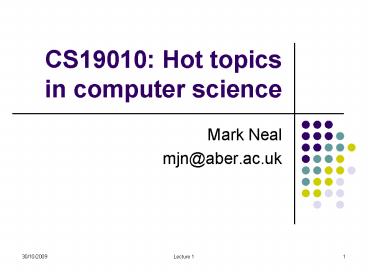CS19010: Hot topics in computer science - PowerPoint PPT Presentation
1 / 14
Title:
CS19010: Hot topics in computer science
Description:
How do they relate to each other? How is what you're learning relevant to them? ... engine is overheating on the second run, or someone heavy got a lift on the ... – PowerPoint PPT presentation
Number of Views:102
Avg rating:3.0/5.0
Title: CS19010: Hot topics in computer science
1
CS19010 Hot topics in computer science
- Mark Neal
- mjn_at_aber.ac.uk
2
Introduction to the module
- Hot (research) topics in computer science
- What are they?
- Why are they difficult?
- How do they relate to each other?
- How is what youre learning relevant to them?
- What constitutes research?
- Why bother doing it?
- How do you go about it?
- How can you tell when youve succeeded?
3
General overview
- Computer science as an area of knowledge
- The computer science department at Aberystwyth
research interests - The research groups
- Computational biology
- Robotics
- Vision, visualization and graphics
- Qualitative reasoning
- Computer education
4
Overview of the field
- Lots of common problems between research areas
- Computational requirements
- Storage requirements
- Searching for data
- Organizing data
- Generating data
- Discovering meaning
- Mapping the real world
Text
5
Vocabulary
- Computational complexity
- Space complexity
- Computable
- Non-computable
- Turing-computable
- Tractable
- ???
- STOP ME AND ASK!!!
6
What is research?
- Systematic investigation
- We really mean scientific research
- So systematic in a particular way
- And novel
- So
- Carefully defined experiments
- Carried out systematically
- In an area of knowledge is new
- And interpreted to work out new knowledge
- All the useful stuff we know started out as
research
7
Why bother?
- A number of reasons
- People are curious
- We want to make the world a better place
- Companies want to make/save money
- Uses for the new knowledge
- Satisfy curiosity
- Make better things beer, cars, phones, houses
- Help people to live better/easier/more efficient
lives - Make lots of money (!!!?)
8
How do you go about it? (1)
- Figure out exactly what it is you want to know
- Write it down carefully
- Devise a (doable and measurable) test of what you
think might be the answer - Do the test and gather the results
- Either
- Analyse the results and draw conclusions
- Redesign the test so that it works
9
How do you go about it? (2)
- Does my car use more petrol when the windows are
open? - With all other factors remaining constant my car
will use more petrol on a particular journey when
the windows are wound down than when they are
not. - The experiment design fill tank to brim drive a
particular route with the windows open and top up
tank again measuring how much it takes to fill it
up. Repeat with windows wound up. - Actually do the test need to worry about whether
the wind changes between runs, or the tyre
pressures change, or the engine is overheating on
the second run, or someone heavy got a lift on
the second run, or I accelerate harder etc - The car breaks down half way through second run
invalidating the results completely. - Or the results are so close to the same that you
cant tell the difference longer trip? More
windows open? When do you give up?
10
How to spot success
- Tricky!
- Cant ever really prove that something is
definitely true - But can prove that it isnt true
- Just because you cant test all possible
circumstances - But can often find a particular case that breaks
a theory - So usually ask the question back-to-front
11
So thats the party line
- But research gets done in lots of other ways
- Container loads of rubber ducks, trainers etc
- Collation and analysis of existing material
- Whacky ideas that just work
- Stealing ideas from other fields and reapplying
them - .
12
Computer Science
- Very often applied (to real situations)
- Computers are often used as tools
- Theoretical computer science is a discipline and
has lots of hard questions unanswered - Most research in this department is applied
- So we are often interested in good enough and
most of the time - So we worry less about proving we are always
right - But means we have to justify everything very
carefully
13
Put it all together
- Think about this stuff in your other modules
- It really does all fit together
- Reading books and papers can be very useful
- Different perspectives
- Examples can clarify
- Disagreements can clarify
- Go and have a root through the library (look in
voyager first if you have a topic in mind)
14
Some reading
- Have a quick look at the papers on the CS19010
web site - Do go for a look round the library (at least
virtually)































